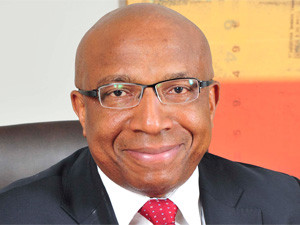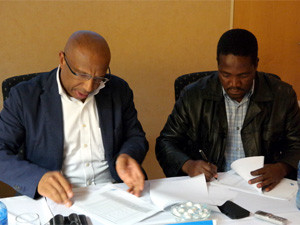
Telkom is asserting that it has inked a cross-cutting, three-year wage deal with its largest union, bringing to an end months' of negotiations and averting a strike. However, the other two unions representing Telkom workers are standing firm, and say the deal cannot be enforced on its members.
Telkom CEO Sipho Maseko and Cecil Mokhantso, president of the Communication Workers' Union (CWU), yesterday signed the agreement, which is backdated to come into effect this April.
Meshack Dlamini, Telkom group executive for employee relations, says the equitable deal will benefit 16 800 staff and only 1 719 employees will not receive an increase for the next three years, but rather once-off payments every month. He said the deal applies to all staff in the bargaining unit, across the board.
The announcement was made by the telco at an urgently scheduled briefing yesterday, at which it also said that if one more union signed, it would have a majority deal. Maseko said: "We've decided to move at the pace of the fastest."
However, both the South African Communications Union (SACU) and Solidarity, neither of which were present at the press briefing, argue that the deal cannot apply to their members, because CWU is not a majority union. Despite Telkom's expectations that SACU will ink the deal next week, SACU says this is not the case.
Solidarity has gone so far as to say, via Twitter, that Maseko has made a "big mistake" by claiming the wage negotiations are at an end.
Not binding
SACU president Michael Hare says any agreement CWU signs would only be applicable to its members, even if it is the biggest union within Telkom. He says it can only be extended to other staff if, under the Labour Relations Act, CWU was considered a majority union, which it is not.
The only way there can be a majority is if either SACU or Solidarity sign, says Hare. He says, however, that the two bodies are clubbing together and will not sign without each other, and Telkom cannot implement the agreement across the board as a result.

"In the event that either us or Solidarity signs and agrees to the same terms, the agreement is enforceable. We will support Solidarity, and we will engage Telkom as a unit."
Solidarity spokesman Marius Croucamp says the law stipulates that a majority union needs to have more than 50%, and CWU is just below this mark, while Solidarity and SACU collectively make up about 31%. "It appears they are playing with numbers... It's not a majority union. They simply ignored the other two."
Yesterday, the union tweeted: "Telkom wage talks: Telkom misleading comms to workers stating CWU is majority union as defined by Labour Relations Act, BIG MISTAKE by CEO [sic]."
Croucamp says the union is looking at its options, but first needs to correct the notion that CWU is a majority union, and that the agreement cuts across the board. He says its options include a strike or potential litigation, and an answer will be received from its members on Tuesday.
Wage concerns
SACU and Solidarity are unhappy with the offer, which they argue amounts to a wage freeze. The two smaller unions say that, while the disparity should be resolved, this should not come out of the wage hike budget.
SACU says there are two outstanding issues that will determine whether it inks a deal. The first is that staff above the 75th percentile in their job classification must get a 3% increase.
Under the deal the CWU signed, staff above this salary range get a monthly, pensionable once-off amount, but no increase in their total packages.
The increase will result in some staff gaining a pay rise of more than 6%, and others less than that. Telkom has agreed to engage with unions if inflation moves above 7.5% and remains there for six consecutive months. Inflation is currently at 5.5%.
Hare adds the 3% increase will also deal with the issue of salary disparities, which was one of Telkom's chief aims when it came to the deal. SACU also wants the support salary band reinstated, as this has been done away with and led to lower salaries for some staff.
SACU has been balloting its members around the offer on the table, and has had responses from about 30% of staff, with 52% of those rejecting the offer. Hare says that, although the mandating process ends today, it will be extended until Monday, if needed, to get to at least a 50% response rate.
Hare says that if the bulk of its members revert with a rejection of the wage offer, the union's only recourse would be a strike.
Telkom may alienate those it needs the most - the skilled staff - by effectively freezing salaries, says Croucamp. "It's sad that things have come this far."
Croucamp points out that many people will not receive an increase in the third year as they climb the salary ladder towards the top of the job level. He says there will be a "big problem" in year three in terms of retention of skilled staff.
Maseko said the process has been a long road and negotiations are never easy, especially in a difficult financial environment and taking Telkom's financial situation into account. He says Telkom and the CWU are committed to ensuring Telkom "returns to its glorious past".
Telkom is expected to issue a statement in response to Solidarity's claims today.
Share